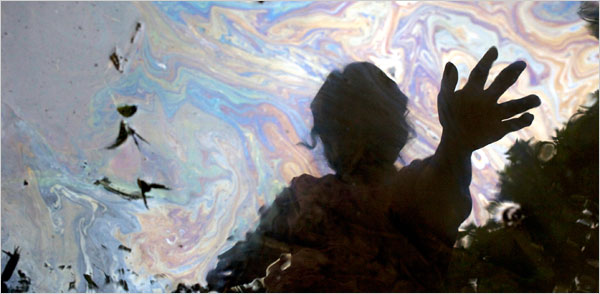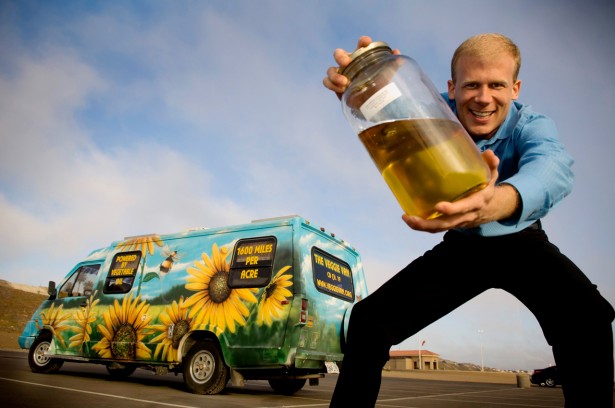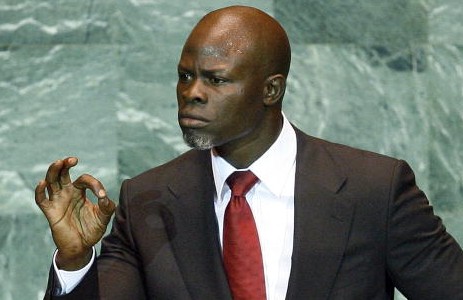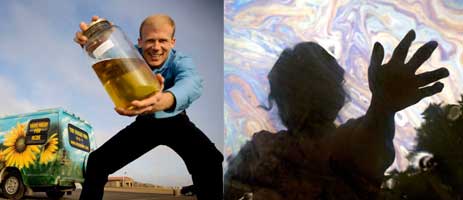Two new documentaries show the damaging effects of the world’s addiction to oil, each film from its own unique angle. Crude, which opened in New York on Sept. 9, traces the story of a lawsuit brought by 30,000 rural Ecuadorians against Chevron, which denies responsibility for turning their traditional rainforest home into a dumping ground for crude oil waste, sickening and killing generations of people. And Fuel, which opened in New York, San Francisco, and Washington, D.C. on Sept. 18, follows director Josh Tickell on his quest to convert the world to biofuels, eliminating the need for oil and thus — hopefully — for lawsuits like the one in Ecuador.
 Oil pollutes the water sources of the Ecuadorians in Crude.Both films succeed in engaging viewers with compelling characters and stories — from the chipper Tickell driving his sunflower-painted, biodiesel-fueled Veggie Van across the country, to the earnest and dogged Ecuadorian lawyer Pablo Fajardo visiting the grave of his murdered brother. And both expose the utter stupidity and reality-denial of Big Oil, an industry unafraid to trample anything or anyone blocking its path to profit, even as the product still driving those profits grows ever more obviously obsolete.
Oil pollutes the water sources of the Ecuadorians in Crude.Both films succeed in engaging viewers with compelling characters and stories — from the chipper Tickell driving his sunflower-painted, biodiesel-fueled Veggie Van across the country, to the earnest and dogged Ecuadorian lawyer Pablo Fajardo visiting the grave of his murdered brother. And both expose the utter stupidity and reality-denial of Big Oil, an industry unafraid to trample anything or anyone blocking its path to profit, even as the product still driving those profits grows ever more obviously obsolete.
“It’s overly simplistic to say these are greedy companies who want to make money at all costs,” Joe Berlinger, who directed Crude, told me on the phone the day after his film’s New York release. (His previous work includes Metallica: Some Kind of Monster). “But there’s an institutional blindness to the impact of their activities on other parts of the world.”
In rural Ecuador, as in many other places off the radar of American consumers, that impact manifests itself in the form of communities that “have been systematically poisoned,” as Trudie Styler (wife of Sting and co-founder of the Rainforest Foundation) put it in the film. Her involvement in and support of the case make up just one part of the starry journey that ultimately led to lawyer Fajardo being featured in Vanity Fair and giving a press conference at the Live Earth concert in New York in 2007.
“Pablo Fajardo walks into a room and just reeks of authenticity and heroism,” Berlinger said of his film’s central character. “This guy has this incredible story. [He] pulls himself up by the bootstraps, gets himself educated with the help of the Catholic church, because he’s motivated to do something about the injustices that he saw as a young man working in those fields. I mean, you can’t make this stuff up.”
Fajardo’s story infuses Crude with what Berlinger calls “the human element,” something he thinks is often missing from the environmental movement. The passion and struggle of Fajardo and other characters — like Maria Garofalo, whose 18-year-old daughter has to travel 18 hours to receive cancer treatments, which she can only afford by continuing to work in the fields — embody the film’s larger theme of environmental justice and oppression.
“It’s kind of a wake-up call as to how we treat our indigenous people,” Berlinger said. “We are eradicating the knowledge and the culture of people who have lived in harmony with nature for millennia, and we should be cherishing their view of consumption and interaction with nature as opposed to eliminating it.”
Berlinger acknowledged that his film is a departure from the theme — heard more loudly in environmental conversations — of the effects of burning fossil fuels. “This is a film about the devastating effects of the procurement of those resources,” he said. “Part of the debate about renewable energy should include, obviously, the impact of production on people and the environment.”
Crude tells the story of those who suffer so we can get our oil fix. Fuel explores the ins and outs of that addiction, and promotes a solution that could kick the habit: biodiesel.
 Fuel director Josh Tickell and his Veggie Van.Speaking through a sometimes-fuzzy cell phone as he crossed mountains in an algae-powered vehicle on his way to Reno, Fuel director Josh Tickell explained how, from its beginnings, “diesel was based in one concept, the nexus of efficiency and sustainability.” Part of his film tells the story of Rudolf Diesel, inventor of the diesel engine, whose values of social and economic justice sometimes went hand-in-hand with his engineering. His engine was created to run on vegetable oil, with the hope that this would “put power back in the hands of everyday farmers.”
Fuel director Josh Tickell and his Veggie Van.Speaking through a sometimes-fuzzy cell phone as he crossed mountains in an algae-powered vehicle on his way to Reno, Fuel director Josh Tickell explained how, from its beginnings, “diesel was based in one concept, the nexus of efficiency and sustainability.” Part of his film tells the story of Rudolf Diesel, inventor of the diesel engine, whose values of social and economic justice sometimes went hand-in-hand with his engineering. His engine was created to run on vegetable oil, with the hope that this would “put power back in the hands of everyday farmers.”
“This is the kind of engine we’d all be driving today had Diesel’s engines been realized,” Tickell said of his car, the Algaeus. But Rudolf Diesel disappeared mysteriously from a ship crossing the English Channel in 1913. Some suggest foul play on the part of competing business interests may have been involved.
Tickell remains remarkably upbeat about biofuels, despite the recent media backlash against them, which, he said, “decimated the biodiesel industry.” His current tour across the country in a fleet of algae-powered vehicles focuses on dispersing information about biofuels and engaging politicians with that information.
“We’re dissolving the barrier between this movement, which is largely an individualistic movement of personal choice, and what should be, needs to be, and will be a political movement,” Tickell said. “We’ve got to get the environmentalists to get that we have allies in our local political leaders.”
Tickell planned to meet with Nevada Gov. Jim Gibbons in Reno, where Gibbons would pour a gallon of algae fuel into the Algaeus. A symbolic gesture, surely, but Fuel shows how it was an accumulation of such small steps that propelled biodiesel on its original path to popularity. Although he said he’s “not going to hold [his] breath for Congress” to pass sweeping climate legislation, Tickell sees the tide turning toward renewable energy.
“We’re in a time of tremendous sea change,” he said. “The corporate concept of a triple bottom line — incorporating sustainability and your ecological footprint into your product — it’s that triple bottom line that’s guiding the next generation of energy companies.”
Put together, Fuel and Crude offer a wide-ranging look at the vast, complex system of interests swirling in the orbit of one magnetically addictive resource. Rather than being disheartened by this intricacy, though, viewers can find inspiration in both films’ stories of struggle and triumph. A goofy college graduate driving a van that smells like French fries can help spark a shift to a new kind of fuel — and all of a sudden veteran truck drivers are filling their rigs with biodiesel and calling our dependence on foreign oil “a flat-ass shame.” A man born into poverty in the Ecuadorian jungle can rise up as a leader for 30,000 of his people, who marvel at his picture in the pages of Vanity Fair. These struggles are far from over, but they’re stories we need to hear. Both new films tell them with spirit and compassion.
Watch the trailer for Crude:
And for Fuel:




